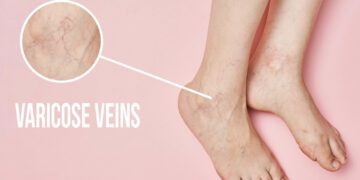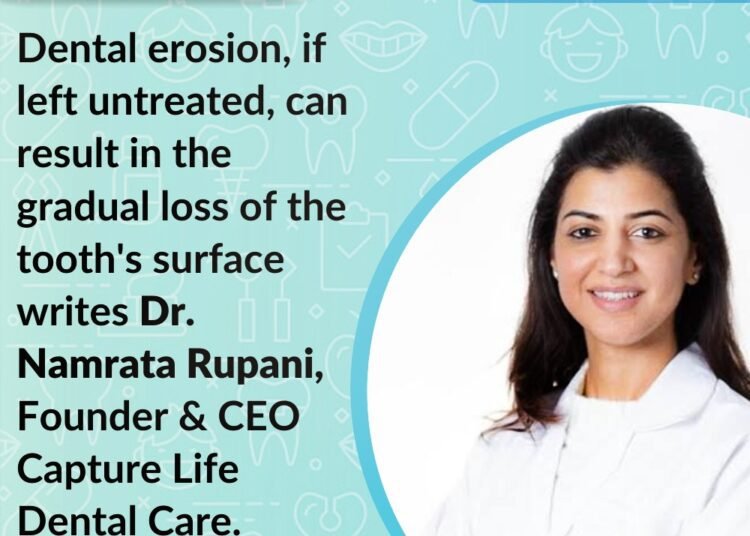By Dr. Namrata Rupani
Ageing causes changes in all of the body’s cells, tissues, and organs. All areas of the body, including the teeth and gums, are affected by these changes. Even though three-quarters of adults who are over the age of 65 still retain part of their natural teeth, continue to have higher rates of gum disease, dental decay, oral cancer, mouth infections, and tooth loss. Several health problems and being under multiple medications are frequently seen in older individuals. Inevitably, it can have an impact on oral health. As one gets older, they tend to develop more health issues, which often require the use of various drugs, which can sometimes be harmful to dental health. Hence the need to prevent dental health and counter dental erosion while ageing.
One of the primary reasons for dental erosion is due to acids generated with the foods consumed or the acids that arise from the stomach. These acids result in loss of the surface of the teeth, otherwise known as dental erosion. These acids are powerful enough to dissolve the crystals that make up the teeth, resulting in tooth surface loss. These acids can also soften the tooth surface, making it easier for abrasion or tooth grinding to wear away, also referred to as acid wear. The stomach contains several powerful acids that aid in the digestion of meals. These stomach acids might enter the mouth as a result of vomiting or reflux. Stomach acids are extremely potent and can cause significant tooth damage.
Let us look at some of the ways to prevent dental erosion while ageing.
Reduce Oral Acidity: Minimise extremely acidic meals and beverages from the diet and only have them during meals to make it easier on the teeth.
Acidic drinks: Changing to low-acid orange juice or using a straw while consuming juices high in acid content will help the teeth avoid acid-led erosions. Rinse the mouth immediately after consuming acidic foods and beverages.
Power of Dairy: Post meals, having a glass of milk or a piece of cheese will neutralise the acidity levels in the mouth.
Avoid sweet snacking: Snacking on sweets throughout the day inevitably raises the risk of tooth decay. After consuming meals heavy in sugar and carbohydrates, the tongue becomes acidic for a few hours. Hence it is best to avoid lots of sweets between mealtimes.
Sugar-free chewing gum: Chewing gum in between meals increases saliva production by up to tenfold. Saliva is a potent, natural anti-erosive agent and acts as a buffer to wash acids from the mouth into the stomach. It also neutralises them and can help cure the early stages of tooth weakening by repairing tooth minerals. Hence it is advisable to chew sugar-free chewing gums to lower the acidic level between meals.
Consume enough water: Drinking plenty of water throughout the day automatically reduces the pH level in the mouth. Dehydration can reduce the amount of saliva in the mouth. On the contrary, staying hydrated enhances the saliva in the mouth.
Choose softer toothbrushes: Toothbrushes come in varying bristle strengths. It is advisable to use soft toothbrushes and brush gently on the teeth. Brushing with rigorous force can cause more damage to the aging teeth.
Fluoride toothpaste: Apart from brushing, toothpaste with fluoride helps in reducing the effects of dental erosion.
Dental erosion, if left untreated, can result in the gradual loss of the tooth’s surface. Loss of tooth structure may necessitate sophisticated and time-consuming dental treatment requiring fillings, veneers, crowns, and perhaps root canal therapy. When symptoms of tooth erosion are noted, it is critical to investigate the reason and make changes.
Prevention can help slow down the natural tooth surface deterioration when combined with the pillars of cavity prevention, i.e — brushing, flossing, and regular dental checkups. People who have difficulty brushing and flossing their teeth by hand due to arthritis or other impairments should use an electric toothbrush. Fluoride, which is present in toothpaste and mouth rinses, assists the body in rebuilding the mineral crystals that make up dental enamel. It also prevents bacteria-laden plaque from sticking to the teeth. Fluoride rinses and gels used by a dentist can slow the course of root decay and, in some circumstances, reverse the damage. While tooth erosion due to unhealthy eating habits can be controlled, regular oral hygiene is important to safeguard against dental erosion caused due to ageing.
The writer is Founder & CEO Capture Life Dental Care
Follow Health In Five on LinkedIn, Facebook, Twitter & Instagram
Subscribe on WhatsApp & Telegram to receive real time updates







































